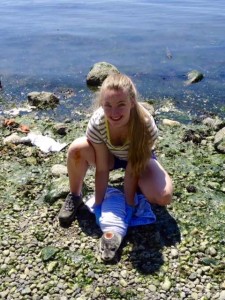Name: Jacq Zier
Class year: 2015
Hometown: Eastsound, Washington
Major: Molecular Biology/Premed
Benton senior Jacq Zier has spent her Colgate career fostering a love for biology. Jacq spent the last two summers interning in her home state of Washington at the SeaDoc Society and the Marine Mammal Stranding Network.
The SeaDoc Society does research focused on measuring and maintaining the health of the Salish Sea, a body of water that stretches from Seattle up through Vancouver. It is a large ecosystem which contains a variety of species. “Seattle and Vancouver are large urban centers that have unloaded a lot of pollution into the water,” Jacq explained. “In addition to that, the area has had a history of overfishing, especially salmon. In essence, the Salish Sea is a really vibrant marine environment, however it has a lot of stresses on it.”
During her first summer at the SeaDoc Society Jacq wrote a species profile of harbor seals. Her article was published in the encyclopedia of Puget Sound, a big project in the region. Additionally, Jacq has made significant contributions to the list of species of concern in the Salish Sea by compiling the four existing lists into one. “A list that accurately describes the status of species diversity is a better metric for looking at the health of the ecosystem, because it is complete, and shows that more and more species are becoming threatened every year”. Jacq presented her findings at the Salish Sea Ecosystem Conference, and won first place for undergraduate presentations.
In addition to her contributions at the SeaDoc Society, Jacq had the opportunity to work as an Assistant Coordinator at the San Juan County Marine Mammal Stranding Network. “Harbor seals are the most abundant marine mammal in the Salish Sea,” Jacq explained. “Their population is at carrying capacity, which means that their populations are limited by food and space. This is a healthy sign for their population, however this also means that many of the seals will die. The population has an approximately 90% mortality rate.”
Mature harbor seals will reproduce once a year. Because all of the seals mate at the same time, they all give birth at the same time. This results in an annual pupping season, when the seals all have their babies within one month, usually July. During pupping season, the Salish Sea is filled with newborn harbor seals. Unfortunately, during this season, the young pups can also lose their mothers and get stranded on beaches.
The Marine Mammal Protection Act however forbids anyone to touch or help any protected marine mammals. “That’s where the marine mammal stranding network comes in. Anyone can call if they have a sighting of a stranded marine animal.” Jacq’s job was to respond to those calls, examine the baby seals, tag them, and monitor them after the physical.
Jacq’s experience on the team left her with a better understanding of the cross section between science and the community. She described: “Working at the Marine Mammal Stranding Network was a really wonderful experience because we were able to translate science to the community, and include people who aren’t normally involved in science. It was fun to share what I know about the biology of harbor seals with others, and to apply my knowledge to a worthwhile cause. People in the community get very attached to harbor seals, so it was fun to not only help the seals, but also talk to so many people who were touched by the seals, and help them understand the ecology and the biology of the animals that they cared so much about.”
By Jessica Spero Li ‘15
jsli@colgate.edu


